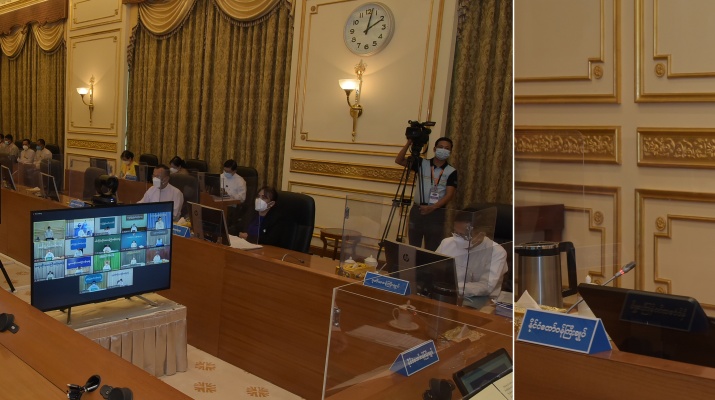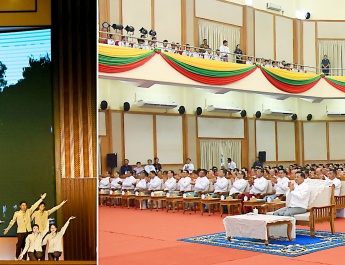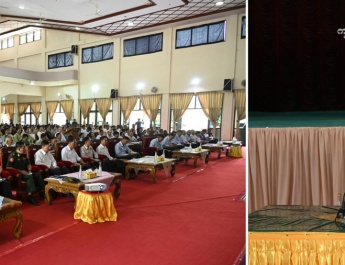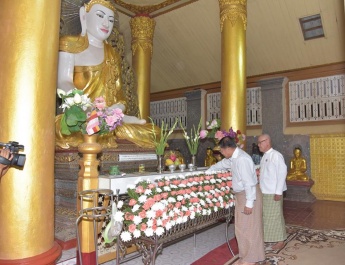Nay Pyi Taw September 22
Chairman of the Financial Commission Chairman of the State Administration Council Prime Minister of the State Se-nior General Min Aung Hlaing delivered an address at the meeting 1/2021 of the Financial Commission at the hall of the Office of the Chairman of the State Administration Council, here, this afternoon.
Also present at the meeting were Vice Chairman of the Financial Commission Vice Chair-man of the State Administration Council Deputy Prime Minister Vice-Senior General Soe Win, Secretary of the Commission Union Minister for Planning and Finance U Win Shein, Union Minister for Legal Affairs Dr Daw Thida Oo, Union Auditor-General Dr Kan Zaw and Deputy Minister U Maung Maung Win together with region and state chief ministers who joined the meeting via video con-ferencing.
The Senior General, in his opening speech, said the meeting 1/2021 of Financial Commi-ssion is to discuss and approve the Union budget for the six month period from 1 October 2021 to 31 March 2022 and the bill of the Union budget.
The State Administration Council formed the Financial Commission on 26 February 2021 and the Provisional Go-vernment of the Republic of the Union of Myanmar on 1 August 2021.
Despite taking State respon-sibilities temporarily, the go-vernment has adopted the five-point roadmap and nine objectives as State policies for fulfilling the needs of people for their socio-economic status. A government needs to effective-ly conduct the public financial management in order to implement its policies. The public financial management comprises income of the State, taxation systems, expenditures for de-velopment tasks and manage-ment, and loan management.
It is necessary to strive for increasing of income to im-plement the adopted policies and systematically allot the budget to the Union and regions and states. To do so, the State Administration Council will enact the State national plan mentioned in the Section 100 (b) of the 2008 Constitution, the annual budget and tax bills in line with the existing laws and procedures.
Being an agro-based country, Myanmar’s financial year from April to March is more appro-priate, and the financial year will be changed from 1 April to 31 March as of 2022-2023 financial year. As such, the budget for the departments and organi-zations was drawn for the six-month period till 31 March 2022.
Currently, the State econo-my was impacted by COVID-19 pandemic. Meanwhile, the country is solving the political disturbances. So, the system-atic management of State budget is very important. The country faced the decline of tax income due to exemption and postpone of tax in 2020-2021 financial year whereas the State owned businesses embraced the decline of income. Hence, the country needs to thriftily spend the budget, and arrangements will be made for spending the cost for compulsory projects.
Spending of total capital ex-penditure must be spent on existing construction projects to be completed within six months, new projects and com-pulsory purchase of materials under the National Planning Law. It is necessary to take care of implementing the pro-ject to spending the fund within six months only. Moreover, Kyat currency should be spent on necessary purchasing and it is necessary to reduce the spending of foreign exchange as much as possible.
Regions and states need to effectively spend the budget on roads, water supply, electricity, production, education, health and social protection which will directly benefit the people, rather than the administration cost.
The Senior General stressed for departments and organi-zations to efficiently spend the funds within six months period. In so doing, Union ministries are to implement the projects in accord with the State financial policies, project policies, trade policies and in-vestment policies whereas regions and states are to contri-bute to the State with the im-plementation of the regional projects.
The Vice Chairman of the Financial Commission Deputy Prime Minister discussed de-tailed scrutiny over the budgets submitted by Union mini-stries and organizations and total capital expenditures by the construction negotiation body, machinery supervisory body and the Planning Department, the meeting between officials from Union level departments and organizations, and region and state govern-ments to scrutinize the budgets, scrutiny for the earmark-ed income and expenditure for six months based on the previous budget, allotment of the expenditure for resuming the suspended State-owned factories under the policies, allotment of the emergency fund for prevention of natural disasters, relief and resettle-ment processes, provisions of more funds to regions and states year by year for fulfilling the needs of the people, and the budget situation for the six-month period.
Secretary of the commission Union Minister for Planning and Finance U Win Shein re-ported on the Union budget for the six-month period from October 2021 to March 2022, and the bill on the Union budget for the six-month period from October 2021 to March 2022.
Union Auditor-General Dr Kan Zaw discussed findings over the budgets for the union level departments and organi- zations and suggestions about measures to be taken in future.
The Senior General said any government has to take measures for prosperity and development of their country. Meanwhile, efforts must be made for boosting production. In seeking income, he stressed the need for the union, re-gion and state governments to boost production of goods.
Only with improved manufac-turing and people’s income, will the State earn full revenues.
Cash flow is necessary for economic growth. The income has to be spent mainly on economic growth and social de-velopment. Although ours is a democratic country, there is a wide range of responsibilities the government has to take. Manufacturing businesses need to have a sense of responsibility to pay their taxes. There are those trying to avoid repaying their loans on the pretext of the COVID-19 pandemic despite having chances of delayed resettlement period. When it comes to estimated revenues, it is necessary to know the chan-nels through which revenues can really be sought. Relevant departments need to review the amount of revenues that should be earned and the cur-rent taxation rates to be able to get more in keeping up with the times. The effort does not aim to cause a burden on the public, but to seek the revenues the State deserves in order to provide more services to them.
The region and state govern-ment must spend their allotted budgets in the interest of the people. Although our govern-ment is not political, we need to implement the projects that directly serve the public inter-est by reducing ostentation.
Our endeavours are not meant for making the government rich but making our country rich.
Tender processes should not involve bribes and must go in line with the rules and procedures. Malpractices cause many losses to the country. Region and state governments need to implement development projects that must be really updated and good. They need to spend the budgets efficiently and avoid unnecessary things. Only then, will we be able to serve the best interest of the country during the period of our duty assumption, the Senior General said.
In his concluding remark, the Senior General said the Union budget for the six-month mini-budget period from 1 October 2021 to 31 March 2022 approved by today’s meeting and budget bill together with the endorsement from the Finance Commission must be sent to the State Administration Council through the provisional government for the enactment of a law.
For the development of in-dustries based on agriculture and livestock, he stressed the need to operate factories and manufacturing businesses regularly and create job opport-unities. He also called for con-stant research for the quality of products and market com-petition. Regarding education and health sectors, measures must be taken for every citizen to improve their education for skills and knowledge and promote public healthcare services.
The union ministries and regional governments need to spend their budgets on education, health and social affairs of the people and projects of electricity, roads, bridges ade-quate supply of drinking and irrigation water rather than departmental expenses.
Budgets related to COVID-19 have been earmarked in the mini-budget period like in the previous fiscal year. It is ne-cessary to raise more funds for COVID-19. For prevention, control and treatment measures, a plan has been made to allot a COVID-19 emergency fund of Ks- 56 billion in the mini-budget period and ano-ther special pandemic fund of Ks-100 billion.
Regarding foreign aid and loans, respective departments and organizations are urged to take measures such as coordi-nating with the countries and organizations concerned to continue the ongoing foreign loan plans and ongoing projects being run by foreign loans, including spending in the bud-gets, reviewing new loans as to whether they are effective, low in interest rate and free from any string attached, and repaying the loans without fail as a responsible country.
If the State is financially str-ong, there will be fewer foreign loans. To do so, full taxes must be collected while revenues from the natural resource sector and State-owned investments and enterprises going to the State fund must be ma-naged in a systematic manner. Meanwhile, it is necessary to invite local and foreign invest-ments and develop private and cooperative sectors. Spending should be as little as possi-ble and any ostentation must be avoided. Seeking revenues that the State deserves will produce a financial strength.
In conclusion, all are urged to actively participate in their respective roles to realize the five-point roadmap and nine objectives adopted by the SAC, the Senior General said.





